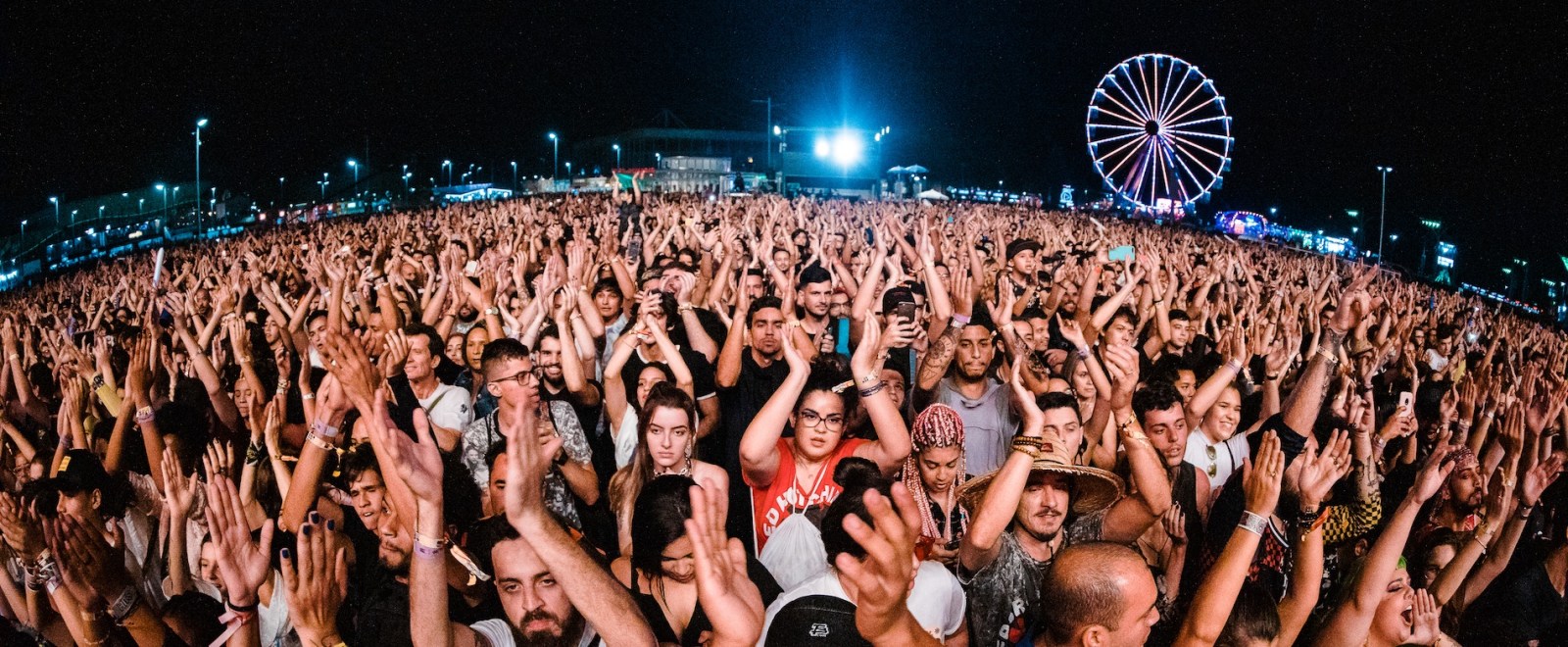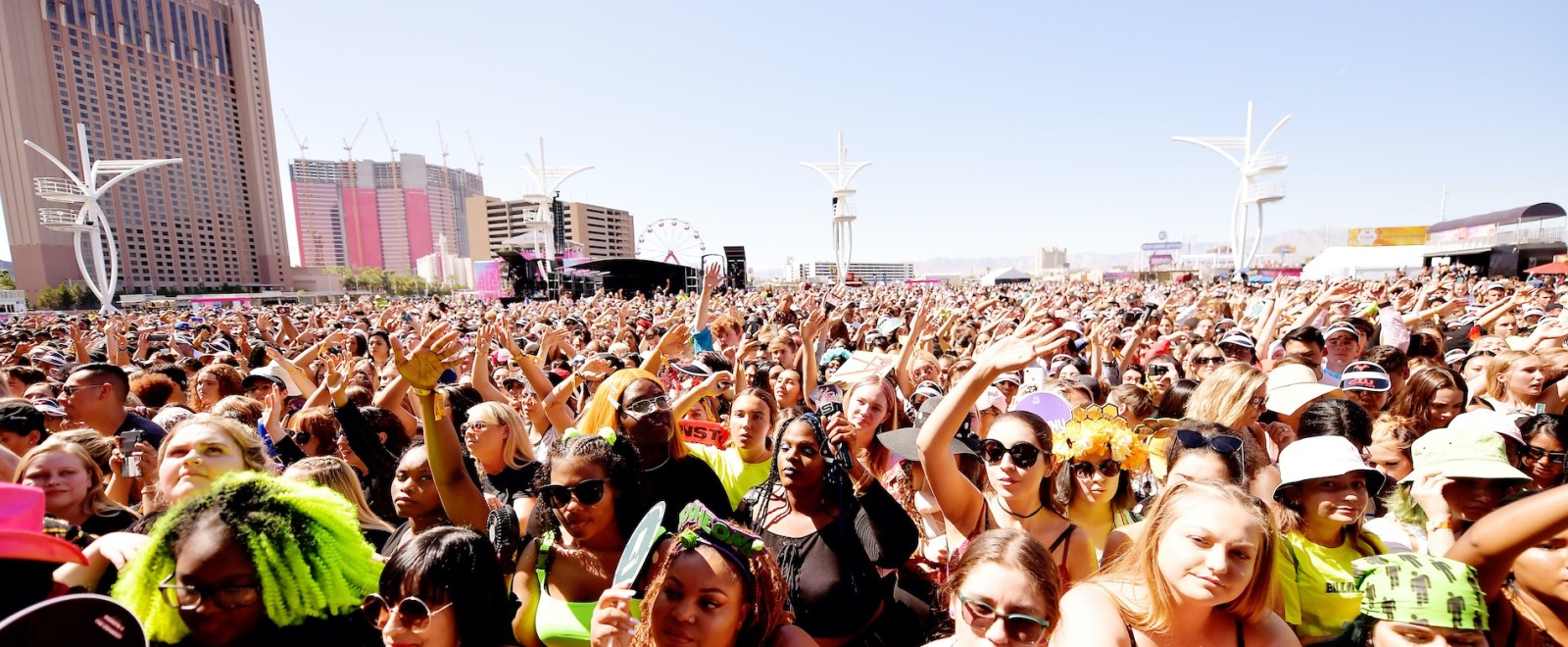
concerts
Drakeo the Ruler’s Brother Files Lawsuit Against Live Nation, Others Over Fatal Stabbing

Billie Eilish Temporarily Stops Show Again to Check on the Crowd

AFROWAVETO to Host ‘Supernatural Showcase’ For Black History Month

Kid Cudi Co-Founded Interactive Live Performance App Encore Launches With $9 Million in Funding Raised

Inside The Impending Return Of Live Music In 2021

Audrey Fix Schaefer remembers all too well the last concert she was able to attend in person: a raucous performance by punk godfathers the Dead Kennedys at 9:30 Club, the D.C. venue where she serves as communications director, on March 11th, 2020.
“I had a lot of tears that night,” she recalled during a recent phone call. “At the time, I thought it was going to be the last show I would see for 20 days. Because D.C. was going to flatten the curve. It was a moment where I was relishing being in the place that brings me so much joy. But there was also so much angst thinking about what happens to our employees. What happens to all the businesses around us? What happens to the bands?”
Over a year later, 9:30 Club, like thousands of venues around the world, remains closed. The bookers for the club have been forced to re-book some shows up to 10 times as they wait for that magical combination of COVID cases dropping, vaccination numbers rising, and the decision makers in the district and the federal government to finally give them the go-ahead to hold shows again.
The past month has shown some glimmers of hope that music fans hungry might be able to feel the waves of a PA rumbling through their systems before 2021 is over. Artists such as psych-grunge mainstays Dinosaur Jr. and pop-country duo SixForty1 recently announced tour dates. Bonnaroo, the outdoor festival held yearly since 2002 in Manchester, Tennessee, dropped the lineup for their 2021 edition (set for the weekend of September 2nd) that includes Foo Fighters, Megan Thee Stallion, Tame Impala, and Lizzo. Other festivals, like the roots-oriented DelFest and Americanafest, and the EDM-centric Electric Zoo, followed suit with their own lineup announcements.
Even 9:30 Club has dates listed on their calendar for as soon as May 25th of this year. It’s a positive sign but one that Schaefer and all the other bookers and venue operators around the world is approaching cautiously.
“One of these days we’re hoping that we’re going to get to open,” she said. “And we will. We just don’t know when it is.”
Concert venues, big and small, were some of the first places to close when the pandemic started spiraling out of control last year — and rightfully so, as, for most people, the need to protect themselves and others far outweighed any desires to stand shoulder-to-shoulder with their fellow music fans. And those same clubs and theaters will likely be the last to reopen even as more people are vaccinated and infection numbers start to drop.
The impact of this global shutdown has been enormous. According to Pollstar, ticket sales in the first quarter of 2021 are down 99% from the year before. And that’s not even counting the loss of revenue still being felt by everyone from musicians to booking agents to bartenders. So the excitement about the prospect of shows, tours, and festivals happening again soon is understandable. But thankfully, most of the people involved with these events are being very careful and downright suspicious as they set about opening their doors and gates to fans again.
“We’ve got to get the ecosystem rebooted by the end of the summer or I’ll be out,” said Jim Brunberg, owner of three venues in Portland, Oregon, including Mississippi Studios, and the founder of the advocacy group Independent Venues Coalition. “And I’m one of the most solid and optimistic people out there. There has to be a rational and science-based approach to reopening. We can’t be fear-based and throwing darts at a moving target.”
The biggest challenge with that is that every state has their own protocols with regards to the pandemic. In New York, for example, Governor Andrew Cuomo is allowing venues to reopen at either 33% capacity or 100 patrons, whichever is highest, while in Texas and Florida, the restrictions have been completely lifted and venues can operate at 100% capacity if they so choose.
While that still does leave open plenty of possibilities for artists to perform, the spotty landscape for reopening presents challenges for anyone hoping to tour the U.S. any time soon.
“It’s a really long planning process in our business,” says Schaefer, who also serves as communications director for the advocacy group National Independent Venue Association. “You have thousands of bands trying to make their way to thousands of venues across the country. You’re not going to go to one town and then skip seven states to get to the next.”
It’s all still a bit of a mess, but there are plenty of positive signs out there that forecast a slow return to normal for the concert industry. Last weekend, City Winery NYC held their first shows in over a year—two performances by Old 97s leader Rhett Miller — with attendees safely socially distanced and mask mandates in place. And their concert calendar is filling up quickly with names like Patti Smith, Stephin Merritt, and Rufus Wainwright.
The Basement East in Nashville also reopened its doors this past weekend after a year that saw the venue hit not only with the pandemic but also a tornado that ripped a hole in the building last March. With repairs done and safety restrictions in place, the club welcomed 132 people for a sold-out show by local rockers Goodbye June, with future weekend shows already booked. Exciting, yes, but to hear co-owner Mike Grimes talk about, still a little bittersweet.
“To be transparent, doing shows in this context is rewarding but it’s not the same,” he said. “It’s rewarding and fun but not great for the people that can’t get up and go talk to somebody in another pod or hug a friend sitting at another table because all these protocols are in place.”
As well, nearly 2,000 tickets have been sold for Moon Crush, a five-day festival headlined by Sheryl Crow and Jason Isbell being held at the end of April in Miramar Beach, Florida. The event is almost like the experience of a cruise ship on land. Concertgoers are expected to rent a house or condo within walking distance of the venue and, with only three acts every night, there’s ample time for other activities in the area.
“We like to use the term ‘music vacation,’” said Andy Levine, the creator of the event. “We want you to get up and have your perfect day, whatever it is. And then we’re going to have five hours of music waiting for you.”
There are still plenty of restrictions in place. Anyone in attendance must have proof of a negative COVID test or vaccination, and they’re expected to keep to their designated viewing area at the venue every night.
That alone is an indication that we’re not nearly clear of this pandemic. Maybe we are only six months away from thousands of people being safe to bounce between stages at the farm where Bonnaroo is held every year. But for smaller spaces like Nashville’s hub for bluegrass and traditional country The Station Inn, there is no guarantee that they’ll be back in business any time soon.
“We’re not in the clear yet,” said Jeff Brown, the Station Inn’s marketing director. “As much as there’s optimism at the moment that it feels like we’re coming out of this thing, we’re not out yet.”
Another 2021 Festival Has Been Canceled, And This Time, It’s Primavera Sound

Last year’s festival season was a total wash thanks to the coronavirus pandemic. Unfortunately, it’s starting to look like 2021 may face a similar fate. LiveNation’s CEO seems to think big concerts can return this summer, but others don’t seem as optimistic. Earlier this year, Glastonbury announced that it would not put on a 2021 festival. A week ago, Boston Calling also announced that they were canceling their 2021 event. Now, another festival has closed its doors for 2021: Primavera Sound.
In a post titled “We will dance in 2022,” organizers wrote today:
“It is with great sadness that we must announce that the 20th anniversary of Primavera Sound Barcelona is postponed until 2022 due to force majeure.
We have tried everything, but we have now made this very painful decision due to the uncertainty surrounding the legal framework for large events on the original dates of the festival — from June 2nd to 6th –, which, added to the restrictions that currently exist, mean that we cannot work normally on the preparation of the festival nor ensure that, once the date arrives, it can be celebrated.
Thank you to all the artists, agencies, sponsors, production companies and workers involved in everything necessary to hold Primavera Sound. And to the attendees, our family, thank you for your faith and love. We owe you the best edition of Primavera Sound, and we are already working on it.
Like last year, we are going to offer all ticket holders the possibility to keep their tickets for next year. It will also be possible to request a refund of the ticket from Wednesday, June 2nd, which is when the Primavera Sound Barcelona 2022 line-up will be revealed.
We will make it doubly good next year.
Until then, take good care of yourself. See you soon.”
This year’s lineup was set to include Pavement, The Strokes, Bad Bunny, Tyler The Creator, Charli XCX, Tame Impala, FKA Twigs, Jamie xx, and Gorillaz, among others.
Check out the announcement below.
We will make it doubly good in 2022. Because yes, really, we will dance together again… and like never before.
More info: https://t.co/2niiylR44L pic.twitter.com/vcQM0xhLBo
— primavera_sound (@Primavera_Sound) March 2, 2021
Some artists covered here are Warner Music artists. Uproxx is an independent subsidiary of Warner Music Group.
LiveNation’s CEO Thinks Big Outdoor Concerts Will Return To The US This Summer

It was around mid-March of 2020 that the first shelter-in-place orders were issued in the United States. That was almost a year ago now, and the future of the live music industry is still uncertain. LiveNation seems to think, though, that they will be able to host large, mostly full concerts this summer.
CEO Michael Rapino said during Live Nation’s Q4 2020 earnings call last week that “a clear outline to a 75 percent to 100 percent” is likely to go forward, noting that 75-plus-percent capacity shows in large US markets are “within sight.” He also noted, “We might have certain states that might not be ready, but we have enough states and enough artists willing to play the open slots if we get to that level in the right markets. So as long as these states open up to the right capacities, we can start in midsummer and in the southern US we can go all the way into November.”
As for shows at a lower capacity, that doesn’t seem to be in LiveNation’s plans, as Rapino said, “[We] have not, to date, done a lot of work in the 0-percent to 50-percent capacity business. We don’t see that as a viable model to ramp back up [considering the] fixed cost.”
This news comes just about a week after Boston Calling decided to cancel its event this year for the second year in a row, so it remains to be seen if other events will follow suit or if LiveNation’s optimism is shared by others.
